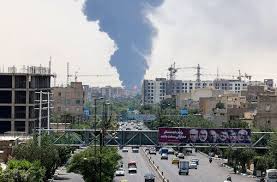Stock futures showed gains before Monday's session, amid the mounting tensions between Israel and Iran that have fueled a surge in oil prices, sparking concerns among investors about the impact on the global economy. Dow Jones Industrial Average futures inched up by 0.02%, while S&P 500 futures increased by 0.14% and Nasdaq 100 futures by 0.19%.
The price of WTI crude oil futures soared by 3% on Sunday night, reaching above $75 per barrel as trading commenced. Market participants have been closely monitoring the situation in the Middle East following Israel's recent strike on Iran, which escalated after Iran retaliated by launching missiles, intensifying the conflict in the region. This series of events triggered a substantial selloff in stocks on Friday, with the Dow plunging over 700 points during the session. Consequently, all three major indexes registered losses of more than 1% by the end of the trading day, pushing them into negative territory for the week. The Dow closed the week with a 1.3% decline, while the S&P 500 and Nasdaq Composite fell by 0.4% and 0.6%, respectively.
In response to the hostilities between Israel and Iran, oil prices surged, with gold prices also rallying as investors sought safe-haven assets in light of the heightened market volatility. The conflict continued over the weekend, with both countries targeting each other's energy facilities, a development that could potentially disrupt the global economy and financial markets in the upcoming week. Iran's threat to shut down the Strait of Hormuz, a critical passage for the oil market, further adds to the uncertainty surrounding the situation.
Ed Mills, a Washington policy analyst at Raymond James, highlighted the significance of the recent strikes, noting that they represent the most substantial attack on Iranian territory since the 1980s. Mills underscored the increased risks of regional escalation, suggesting that the extent of further hostilities might depend on the involvement of the United States and Russia in the ensuing weeks and days. With manufacturing survey data set to be released on Monday morning, investors are keen to assess the economic impact amid the Federal Reserve's upcoming interest rate decision later in the week. While Fed funds futures indicate a high probability of the central bank maintaining rates, President Donald Trump's calls for a rate cut and the escalating tensions in the Middle East could influence the Fed's policy outlook in the near term.
Following Israel's recent strikes on Iranian energy facilities, crude oil futures surged over 3% on Sunday evening. U.S. crude oil prices climbed by $2.37 to $75.35 per barrel, while the global benchmark Brent rose by $2.42 to $76.65 per barrel. Israel's actions targeting natural gas facilities and an oil depot in Iran have raised concerns about a potential expansion of the conflict to include energy infrastructure in the region. Oil prices recorded a more than 7% gain on Friday after Israel conducted a series of airstrikes against Iran's nuclear and missile programs, marking the largest single-day increase since Russia's invasion of Ukraine in March 2022.
Despite the recent gains in oil prices, stocks are entering a new week after concluding the previous one with losses. The Dow finished the preceding week down by 1.3%, primarily driven by the significant drop on Friday, while the S&P 500 and Nasdaq Composite ended the week lower by 0.4% and 0.6%, respectively.
As the market anticipates developments in the ongoing conflict between Israel and Iran, stock futures dipped on Sunday night. Dow futures declined by more than 170 points around 6 p.m. ET, while S&P 500 and Nasdaq 100 futures each slid by 0.4%.
In conclusion, the interplay of geopolitical tensions in the Middle East and their impact on global markets underscores the interconnectedness of political events and financial outcomes. The evolving situation between Israel and Iran continues to be a focal point for investors, shaping market sentiment and influencing asset prices. Amidst uncertainties surrounding the conflict, market participants are closely monitoring developments and their potential implications on economic stability and investment strategies.

